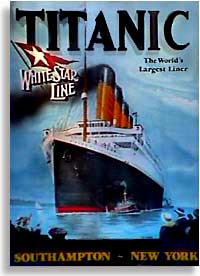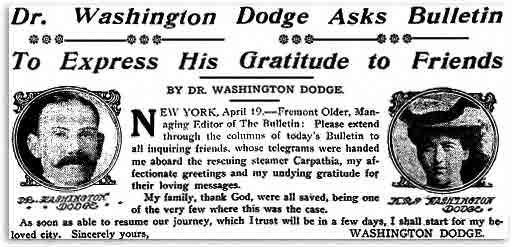|
NEW YORK,
April 19.—Dr. Washington Dodge of San Francisco, at the
Hotel
Wolcott
here, gave the following account of the wreck:
“We had retired to our stateroom, and
the noise of the collision was not at all alarming. We had just fallen
asleep. My wife awakened me and said that something had happened to the
ship. We went on deck and everything seemed quiet and orderly.
“The orchestra was playing a lively
tune. They started to lower the lifeboats after a lapse of some minutes.
There was little excitement.
SHIP SEEMED SAFER.
“As the lifeboats were being launched,
many of the first-cabin passengers expressed their preference of staying
on the ship. The passengers were constantly being assured that there was
no danger, but that as a matter of extra precaution the women and children
should be placed in the lifeboats.
 “Everything
was still quiet and orderly when I placed Mrs. Dodge and the boy in the
fourth or fifth boat. I believe there were 20 boats lowered away altogether.
I did what I could to help in keeping order, as after the sixth or seventh
boat was launched the excitement began.
“Everything
was still quiet and orderly when I placed Mrs. Dodge and the boy in the
fourth or fifth boat. I believe there were 20 boats lowered away altogether.
I did what I could to help in keeping order, as after the sixth or seventh
boat was launched the excitement began.
“Some of the passengers fought with
such desperation to get into the lifeboats that the officers shot them,
and their bodies fell into the ocean.
“It was 10:30 when the collision occurred,
and 1:55 o’clock when the ship went down,” he said. “Major Archibald Butt
stood with John Jacob Astor as the water rolled over the Titanic.
CAPTAIN WAS CALM.
“I saw Colonel Astor, Major Butt and
Captain Smith standing together about 11:30 o’clock. There was absolutely
no excitement among them. Captain Smith said there was no danger.
“The starboard side of the Titanic
struck the big berg and the ice was piled up on the deck. None of us had
the slightest realization that the ship had received its death wound.
“Mrs. [Isidor] Straus showed most admirable
heroism. She refused in a very determined manner to leave her husband,
although she was twice entreated to get into the boats. Straus declined
with great force to get in the boat while any women were left.
“I wish you would say for me that Colonel
Astor, Major Butt, Captain Smith and every man in the cabins acted the
part of a hero in that awful night.
“As the excitement began I saw an officer
of the Titanic shoot down two steerage passengers who were endeavoring
to rush the lifeboats. I have learned since that twelve of the steerage
passengers were shot altogether, one officer shooting down six.
The first-cabin
men and women behaved with great heroism.”
OWES LIFE TO STEWARD.
One of the stewards of the Titanic,
with whom Mrs. and Mrs. Dodge had crossed the Atlantic before on the Olympic,
knew them well. He recognized Dodge as the thirteenth boat was being filled.
The steerage passengers were being shot down and some of the steerage passengers
were stabbing right and left in an endeavor to reach the boat.
The thirteenth boat was filled on one
side with children, fully 20 or 30 of them, and a few women. All in the
boat were panic-stricken and screaming. The steward had been ordered
to take charge of the thirteenth, and, seizing Dodge, pushed him into the
boat, exclaiming that he needed his help in caring for his helpless charges.
Dodge said that when the boats were
drawing away from the ship they could hear the orchestra playing “Lead,
Kindly Light,” and rockets were going up from the Titanic in the wonderfully
clear night. “We could see from the distance that two boats were being
made ready to be lowered. The panic was in the steerage, and it was that
portion of the ship that the shooting was made necessary.
“I will never forget,” Mrs. Dodge said,
“the awful scene of the great steamer as we drew away. From the upper rails
heroic husbands and fathers were waving and throwing kisses to their womenfolk
in the receding lifeboats.”
The Bulletin
San Francisco, April 19, 1912
Return to the top of the page.
|


 “Everything
was still quiet and orderly when I placed Mrs. Dodge and the boy in the
fourth or fifth boat. I believe there were 20 boats lowered away altogether.
I did what I could to help in keeping order, as after the sixth or seventh
boat was launched the excitement began.
“Everything
was still quiet and orderly when I placed Mrs. Dodge and the boy in the
fourth or fifth boat. I believe there were 20 boats lowered away altogether.
I did what I could to help in keeping order, as after the sixth or seventh
boat was launched the excitement began.